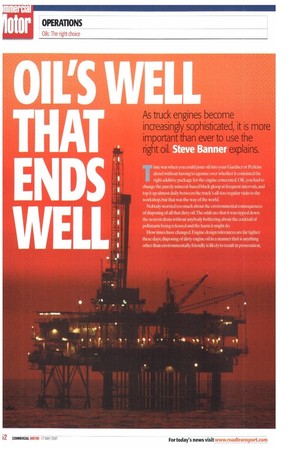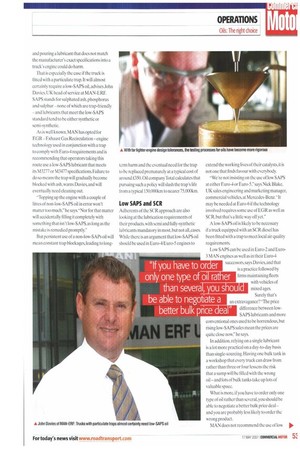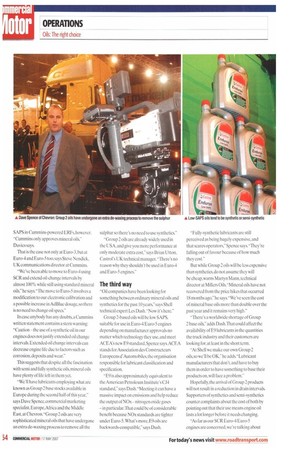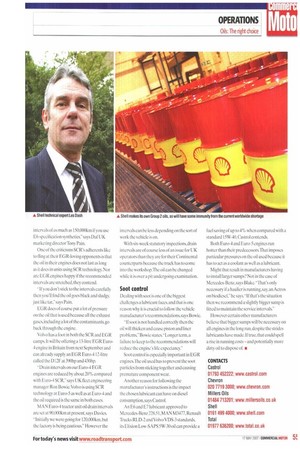131111 THAT ENDS" WELL
Page 52

Page 53

Page 54

Page 55

If you've noticed an error in this article please click here to report it so we can fix it.
• As truck engines become increasingly sophisticated, it is more
importa • "I' er t se th right oil, Steve Ba r xplai
nrie was when you could pour oil into your Gardner or 'er ins diesel without having to agonise over whether it contained the right additive package for the engine concerned.OK, you had to change the purely mineral-based black gloop at frequent intervals, and top it up almost daily between the truck's all-too-regular visits to the workshop, but that was the way of the world.
Nobody worried too much about the environmental consequences of disposing of all that dirty oil.The odds are that it was tipped down the nearest drain without anybody bothering about the cocktail of pollutants being released and the harm it might do.
How times have changed. Engine design tolerances are far tighter these days; disposing of dirty engine oil in a manner that is anything other than environmentally friendly is likely to result in prosecution,
and pouring a lubricant that does not match the manufacturer's exact specifications into a truck's engine could do harm.
That is especially the case if the truck is fitted with a particulate trap. It will almost certainly require a low-SAPS oil, advises John Davies, UK head of service at MAN-ERE SAPS stands for sulphated ash, phosphorus and sulphur none of which are trap-friendly and lubricants that meet the low-SAPS standard tend to be either synthetic or semi-synthetic.
As is well known, MAN has opted for EGR Exhaust Gas Recirculation -engine technology used in conjunction with a trap to comply with F,uro-4 requirements and is recommending that operators taking this route use a low-SAPS lubricant that meets its M3277 or M3477 specifications. Failure to do so means the trap will gradually become blocked with ash, warns Davies, and will eventually need cleaning out.
"Topping up the engine with a couple of litres of non-low-SAPS oil in error won't matter too much," he says."Nor for that matter will accidentally filling it completely with something that isn't low-SAPS, as long as the mistake is remedied promptly."
But persistent use of a non-low-SAPs oil will mean constant trap blockages, leading to long term harm and the eventual need for the trap Lobe replaced prematurely at a typical cost of around £350. Oil companyTotal calculates that pursuing such a policy will slash the trap's life from a typical 150,000km to nearer 75,000km.
Low SAPS and SCR
Adherents of the SCR approach are also looking at the lubrication requirements of their products, with semi and fully-synthetic lubricants mandatory in most, but not all, cases. While there is an argument that low-SAPS oil should be used in Euro-4/Euro-5 engines to extend the working lives of their catalysts, it is not one that finds favour with everybody.
-We're not insisting on the use of low SAPS at either Euro-4 or Euro-5," says Nick Blake, UK sales engineering and marketing manager, commercial vehicles, at Mercedes-Benz. "It may be needed at Euro-6 if the technology involved requires some use of EGR as well as SCR, hut that's a little way off yet.
A low-SAPS oil is likely to be necessary if a truck equipped with an SCR diesel has been fitted with a trap to meet local air quality requirements.
Low SAPS can be used in Euro-2 and Euro3 MAN engines as well as in their Euro-4 successors, says Davies, and that is a practice followed by firms maintaining fleets with vehicles of mixed ages.
Surely that's an extravagance? "The price difference between lowSAPS lubricants and more conventional ones used to be horrendous, but rising low-SAPS sales mean the prices are quite close now," he says.
In addition. relying on a single lubricant is a lot more practical on a day-to-day basis than single-sourcing. Having one hulk tank in a workshop that every truck can draw from rather than three or four lessens the risk that a sump will he filled with the wrong oil-and lots of bulk tanks take up lots of valuable space.
What is more, if you have to order only one type of oil rather than several, you should be able to negotiate a better bulk price deal and you are probably less likely to order the wrong product.
MAN does not recommend the use of low I.. SAPS in Cummins-powered ERFs, however. "Cummins only approves mineral oils," Davies says.
That is the case not only at Euro-3, but at Euro-4 and Euro-5 too, says Steve Nendick, UK communications director at Cummins.
"We've been able to move to Euro-4 using SCR and extend oil-change intervals by almost 100% while still using standard mineral oils," he says. "The move to Euro-5 involves a modification to our electronic calibration and a possible increase in AdBlue dosage, so there is no need to change oil specs."
In case anybody has any doubts, a Cummins written statement contains a stern warning: -Caution the use of a synthetic oil in our engines does not justify extended oil change intervals. Extended oil change intervals can decrease engine life due to factors such as corrosion, deposits and wear."
This suggests that despite all the fascination with semi and fully synthetic oils, mineral oils have plenty of life left in them yet.
"We'll have lubricants employing what are known as Group 2 base stocks available in Europe during the second half of this year," says Dave Spence, commercial marketing specialist, Europe,Africa and the Middle East, at Chevron. "Group 2 oils are very sophisticated mineral oils that have undergone an extra de-waxing process to remove all the sulphur so there's no need to use synthetics."
-Group 2 oils are already widely used in the USA, and give you more performance at only moderate extra cost," says Brian Utton, Castrol's UK technical manager.-There's no reason why they shouldn't be used in Euro-4 and Euro-5 engines."
The third way "Oil companies have been looking for something between ordinary mineral oils and synthetics for the past 10 years," says Shell technical expert Les Dash. "Now it's here."
Group 2-based oils will be low SAPS, suitable for use in Euro-4/Euro-5 engines depending on manufacturer approvals no matter which technology they use, and meet ACEA's new E9 standard, Spence says. ACEA stands for Association des Constructeurs Europeens d'Automobiles, the organisation responsible for lubricant classification and specification.
"E9 is also approximately equivalent to the American Petroleum Institute's C.J4 standard," says Dash."Meeting it can have a massive impact on emissions and help reduce the output of NOx -nitrogen oxide gases -in particular.That could be of considerable benefit because NOx standards are tighter under Euro-5. What's more, E9 oils are backwards-compatible," says Dash. "Fully-synthetic lubricants are still perceived as being hugely expensive, and that scares operators," Spence says. They're falling out of favour because of how much they cost."
But while Group 2 oils will be less expensive than synthetics, do not assume they will be cheap, warns Martyn Mann, technical director at Millers Oils. "Mineral oils have not recovered from the price hikes that occurred IS months ago," he says. "We've seen the cost of mineral base oils more than double over the past year and it remains very high."
"There's a worldwide shortage of Group 2 base oils," adds Dash:That could affect the availability of E9 lubricants in the quantities the truck industry and their customers are looking for, at least in the short term.
-At Shell we make our own Group 2 oils, so we'll be OK," he adds."Lubricant manufacturers that don't, and have to buy them in order to have something to base their products on, will face a problem.
Hopefully, the arrival of Group 2 products will not result in a reduction in drain intervals. Supporters of synthetics and semi-synthetics counter complaints about the cost of both by pointing out that their use means engine oil lasts a lot longer before it needs changing.
"As far as our SCR Euro-4/Euro-5 engines are concerned, we're talking about intervals of as much as 150,000km if you use E6-specilication synthetics," says Daf UK marketing director Tony Pain.
One of the criticisms SCR's adherents like to fling at their EGR-loving opponents is that the oil in their engines does not last as long as it does in units using SCR technology, Nor are EGR engines happy if the recommended intervals are stretched, they contend, If you don't stick to the intervals carefully then you'll find the oil goes black and sludgy, just like tar," says Pain.
EG R does of course put a lot of pressure on the oil that is used because all the exhaust gases, including a lot of the contaminants,go back through the engine.
Volvo has a foot in both the SCR and EGR camps. It will be offering a 13-litre EGR Euro4 engine in Britain from next September and can already supply an EGR Euro-4 12-litre called the D1217 at 390hp and 430hp.
"Drain intervals on our Euro-4 EGR engines are reduced by about 20% compared with Euro-4 SCR," says UK fleet engineering manager Ron Bowie. Volvo is using SCR technology at Euro-5 as well as at Euro-4 and the oil required is the same in both cases.
MAN Euro-4 tractor unit oil drain intervals are set at 90,000km at present, says Davies. "Initially we were going for 120,000km, but the factory is being cautious." However the intervals can he less depending on the sort of work the vehicle is on.
With six-week statutory inspections, drain intervals are of course less of an issue for UK operators than they are for their Continental counterparts because the truck has to come into the workshop.The oil can be changed while it is over a pit undergoing examination.
Soot control
Dealing with soot is one of the biggest challenges a lubricant faces, and that is one reason why it is crucial to follow the vehicle manufacturer's recommendations, says Bowie.
-If soot is not handled correctly then the oil will thicken and cause piston and liner problems," Bowie states."Longer tenn, a failure to keep to the recommendations will reduce the engine's life expectancy."
Soot control is especially important in EGR engines.The oil used has to prevent the soot particles from sticking together and causing premature component wear.
Another reason for following the manufacturer's instructions is the impact the chosen lubricant can have on diesel consumption, says Castrol.
An E6 and E7 lubricant approved to Mercedes-Benz 228.51, MAN M3477, Renault Trucks RLD-2 and Volvo VDS-3 standards, its Elixion Low-SAPS 5W-30 oil can provide a
fuel saving of up to 4% when compared with a standard 15W-40, Castro! contends.
Both Euro-4 and Euro-5 engines run hotter than their predecessors.That imposes particular pressures on the oil used because it has to act as a coolant as well as a lubricant.
Might that result in manufacturers having to install larger sumps? Not in the case of Mercedes-Benz, says Blake. "That's only necessary if a haulier is running, say, an Actros on biodiesel," he says." If that's the situation then we recommend a slightly bigger sump is fitted to maintain the service intervals."
However certain other manufacturers believe that bigger sumps will be necessary on all engines in the long run, despite the strides lubricants have made. If true, that could spell a rise in running costs — and potentially more dirty oil to dispose of. • CONTACTS Castrol 01793 452222; www.castrol.com Chevron 020 7719 3000; www.chevron.com Millers Oils 01484713201; www.millersoils.co.uk Shell 0161 499 4000; www.shell.com Total 01977 636200; www.total.co.uk






























































































































































































